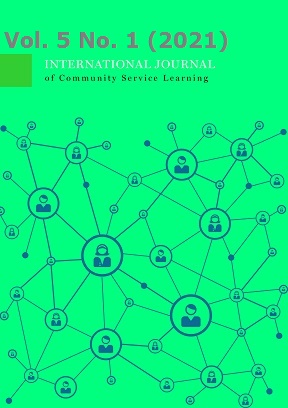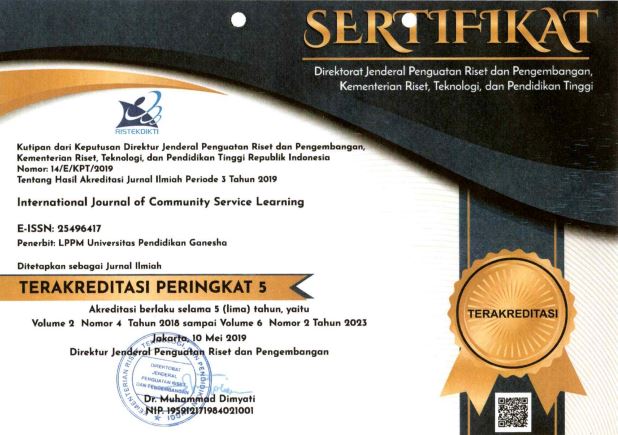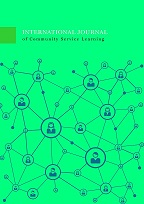Training Treatment Skill of Children Abuse Victims for College Students
DOI:
https://doi.org/10.23887/ijcsl.v5i1.30566Kata Kunci:
Child Abuse, Treatment SkillAbstrak
Child abuse is a serious phenomenon that needs treatment to recover the victims. The problems occurred are the students are lack of understanding in giving treatments for child abuse victims, and they have no experience and skills in giving treatment to child as abuse victims. The present article aims at describing a training of giving treatments to recover children as victims from abuse and violence to show the students’ (participants) knowledge and service before they do internship program at an orphanage in order to have knowledge and skills to give treatments for child abuse victims. The type of research is descriptive qualitative. The subject of research is 7th semester students of guidance and counseling, Indonesia. The methods in collecting the data used observation and a questionnaire. In analyzing the data, the researcher used interactive analysis that covers data display, data reduction, and conclusion drawing. The result of the research are the improvements of the college students’ knowledge and service in giving treatment for child abuse victims; they are familiar with six forms of treatment to recover the victims that consist of Combined Parent-Child Cognitive Behavioral Therapy (CPC-CBT), Parent Training and Multi-systemic Therapy, Project Support (Children’s Protective Services), Web-based parenting skills, Home Visiting Program, and School Based Mental Health Intervention for Children. So, are treatments in the form of collaboration between parents (caregivers), schools, and children (as victims) to recover child abuse and violence through a variety of phases to realize the purposes and children abuse as victims need appropriate treatment based on the condition of them and such six treatments as a choice and solution to recover the victims. The research is that the improvement of knowledge and skills of the students to give treatment for children as abuse victims.
Referensi
Afifi, T. O., Mota, N. P., Dasiewicz, P., MacMillan, H. L., & Sareen, J. (2012). Physical punishment and mental disorders: Results from a nationally representative US sample. Pediatrics, 130(2), 184–192. https://doi.org/10.1542/peds.2011-2947.
Akmatov, M. K. (2011). Child abuse in 28 developing and transitional countries-results from the multiple indicator cluster surveys. International Journal of Epidemiology, 40(1), 219–227. https://doi.org/10.1093/ije/dyq168.
Biçakçi, M. Y., Er, S., & Aral, N. (2016). An overview of child neglect and abuse: Types, causes, impact and prevention. Studies on Ethno-Medicine, 10(2), 221–228. https://doi.org/10.1080/09735070.2016.11905491.
Casillas, K. L., Fauchier, A., Derkash, B. T., & Garrido, E. F. (2016). Implementation of evidence-based home visiting programs aimed at reducing child maltreatment: A meta-analytic review. Child Abuse and Neglect, 53, 64–80. https://doi.org/10.1016/j.chiabu.2015.10.009.
Celano, M., NeMoyer, A., Stagg, A., & Scott, N. (2018). Predictors of Treatment Completion for Families Referred to Trauma-Focused Cognitive Behavioral Therapy After Child Abuse. Journal of Traumatic Stress, 31(3), 454–459. https://doi.org/10.1002/jts.22287.
Chan, L., Erlings, E., Mizunoya, S., & Zaw, H. (2016). A City Fit for Children : Mapping and Analysis of Child Friendly Cities Initiatives. Centre for Rights and Justice Occasional Paper Series, 5.
Damm, A. (2011). Mahatma Gandhi and Character Education in Non-Violence: Its Relevance in Religious Studies Today. Teaching Theology and Religion, 14(1), 3–12. https://doi.org/10.1111/j.1467-9647.2010.00667.x.
Dendape, G. A. R., Frederik, W. A. P. G., Mawuntu, J. R., & Senewe, E. V. T. (2019). The Impact of Psychological Violence on Children and Legal Protection Efforts in Indonesia. Journal of Law, Policy and Globalization, 82, 82–91. https://doi.org/10.7176/jlpg/82-11.
Farnia, V., Salemi, S., Mordinazar, M., Khanegi, M., Tatari, F., Golshani, S., Jamshidi, P., & Alikhani, M. (2020). The effect of child-abuse on the behavioral problems in the children of the parents with substance use disorder: Presenting a model of structural equations. Journal of Ethnicity in Substance Abuse. https://doi.org/10.1080/15332640.2020.1801547.
Fonagy, P., Butler, S., Cottrell, D., Scott, S., Pilling, S., Eisler, I., Fuggle, P., Kraam, A., Byford, S., Wason, J., Smith, J. A., Anokhina, A., Ellison, R., Simes, E., Ganguli, P., Allison, E., & Goodyer, I. M. (2020). Multisystemic therapy versus management as usual in the treatment of adolescent antisocial behaviour (START): 5-year follow-up of a pragmatic, randomised, controlled, superiority trial. The Lancet Psychiatry, 7(5), 420–430. https://doi.org/10.1016/S2215-0366(20)30131-0.
Fonagy, P., Butler, S., Goodyer, I., Cottrell, D., Scott, S., Pilling, S., Eisler, I., Fuggle, P., Kraam, A., Byford, S., Wason, J., & Haley, R. (2013). Evaluation of multisystemic therapy pilot services in the Systemic Therapy for At Risk Teens (START) trial: Study protocol for a randomised controlled trial. Trials, 14(1), 1–19. https://doi.org/10.1186/1745-6215-14-265.
Grogan-Kaylor, A. (2004). The effect of corporal punishment on antisocial behavior in children. Social Work Research, 28(3), 153–162. https://doi.org/10.1093/swr/28.3.153
Henggeler, S. W., & Schaeffer, C. M. (2016). Multisystemic Therapy(®) : Clinical Overview, Outcomes, and Implementation Research. Family Process, 55(3), 514–528. https://doi.org/10.1111/famp.12232.
Jouriles, E. N., McDonald, R., Rosenfield, D., Norwood, W. D., Spiller, L., Stephens, N., Corbitt-Shindler, D., & Ehrensaft, M. (2010). Improving Parenting in Families Referred for Child Maltreatment: A Randomized Controlled Trial Examining Effects of Project Support. Journal of Family Psychology, 24(3), 328–338. https://doi.org/10.1037/a0019281.
Khoeriyah, N., Warto, & Sariyatun. (2018). Learning history integrated local wisdom values " babad Banyumas " to build a student ’ s national identity. 00091, 1–6. https://doi.org/https://doi.org/10.1051/shsconf/20184200091.
Markham, A. (2018). A Review Following Systematic Principles of Multisystemic Therapy for Antisocial Behavior in Adolescents Aged 10–17 Years. Adolescent Research Review, 3(1), 67–93. https://doi.org/10.1007/s40894-017-0072-1.
Mast, J. E., Antonini, T. N., Raj, S. P., Oberjohn, K. S., Cassedy, A., Makoroff, K. L., & Wade, S. L. (2014). Web-based parenting skills to reduce behavior problems following abusive head trauma: A pilot study. Child Abuse and Neglect, 38(9), 1487–1495. https://doi.org/10.1016/j.chiabu.2014.04.012.
Narad, M. E., Taylor, H. G., Yeates, K. O., Stancin, T., Kirkwood, M. W., & Wade, S. L. (2017). Internet-based Interacting Together Everyday, Recovery After Childhood TBI (I-InTERACT): Protocol for a multi-site randomized controlled trial of an internet-based parenting intervention. Digital Health, 3, 205520761771942. https://doi.org/10.1177/2055207617719423.
O’Leary, P., Coohey, C., & Easton, S. D. (2010). The Effect of severe child sexual abuse and disclosure on mental health during adulthood. Journal of Child Sexual Abuse, 19(3), 275–289. https://doi.org/10.1080/10538711003781251.
Ristkari, T., Kurki, M., Suominen, A., Gilbert, S., Sinokki, A., Kinnunen, M., Huttunen, J., McGrath, P., & Sourander, A. (2019). Web-based parent training intervention with telephone coaching for disruptive behavior in 4-year-old children in real-world practice: Implementation study. Journal of Medical Internet Research, 21(4), 1–17. https://doi.org/10.2196/11446.
Rogers, J. C., & Broome, M. R. (2020). Effectiveness of multisystemic therapy for adolescent antisocial behaviour: follow-up findings from the START trial. The Lancet Psychiatry, 7(5), 375–376. https://doi.org/10.1016/S2215-0366(20)30167-X.
Rueness, J., Myhre, M. C., Strøm, I. F., Wentzel-Larsen, T., Dyb, G., & Thoresen, S. (2019). The mediating role of posttraumatic stress reactions in the relationship between child abuse and physical health complaints in adolescence and young adulthood. European Journal of Psychotraumatology, 10(1). https://doi.org/10.1080/20008198.2019.1608719.
Ruiz-Casares, M., Lilley, S., Thombs, B. D., Platt, R. W., Scott, S., Isdijoso, W., Hermanus, E., Andrina, M., & Mayo, N. (2019). Protocol for a cluster randomised controlled trial evaluating a parenting with home visitation programme to prevent physical and emotional abuse of children in Indonesia: The Families First Programme. BMJ Open, 9(1), 1–12. https://doi.org/10.1136/bmjopen-2018-021751.
Runyon, M. K., Deblinger, E., & Steer, R. A. (2010). Group cognitive behavioral treatment for parents and children at-risk for physical abuse: An initial study. Child and Family Behavior Therapy, 32(3), 196–218. https://doi.org/10.1080/07317107.2010.500515
Springer, C., & Misurell, J. R. (2012). Game-based cognitive-behavioral therapy individual model for child sexual abuse. International Journal of Play Therapy, 21(4), 188–201. https://doi.org/10.1037/a0030197.
Taillieu, T. L., Cheung, K., Sareen, J., Katz, L. Y., Tonmyr, L., & Afifi, T. O. (2019). Caregiver Vulnerabilities Associated With the Perpetration of Substantiated Child Maltreatment in Canada: Examining the Canadian Incidence Study of Reported Child Abuse and Neglect (CIS) 2008. Journal of Interpersonal Violence, 1–29. https://doi.org/10.1177/0886260519889941.
Tol, W. A., Komproe, I. H., Jordans, M. J. D., Ndayisaba, A., Ntamutumba, P., Sipsma, H., Smallegange, E. S., Macy, R. D., & De Jong, J. T. V. M. (2015). School-based mental health intervention for children in war-affected Burundi: A cluster randomized trial. Childhood Adversity and Developmental Effects: International and Cross-Disciplinary Perspectives, 271–295. https://doi.org/10.1201/b18372.
Tsur, N., & Abu-Raiya, H. (2020). COVID-19-related fear and stress among individuals who experienced child abuse: The mediating effect of complex posttraumatic stress disorder. Child Abuse and Neglect, July, 1–11. https://doi.org/10.1016/j.chiabu.2020.104694.
Vitale, M. A., Squires, J., Zuckerbraun, N. S., & Berger, R. P. (2010). Evaluation of the siblings of physically abused children: A comparison of child protective services caseworkers and child abuse physicians. Child Maltreatment, 15(2), 144–151. https://doi.org/10.1177/1077559509360250.
Yoon, D. (2020). Peer-relationship patterns and their association with types of child abuse and adolescent risk behaviors among youth at-risk of maltreatment. Journal of Adolescence, 80(September 2019), 125–135. https://doi.org/10.1016/j.adolescence.2020.02.008.
Unduhan
Diterbitkan
Cara Mengutip
Terbitan
Bagian
Lisensi

International Journal of Comunnity Service Learning is licensed under a Creative Commons Attribution-ShareAlike 4.0 International License.













